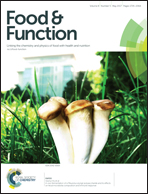Safety evaluation and lipid-lowering effects of food-grade biopolymer complexes (ε-polylysine-pectin) in mice fed a high-fat diet
Abstract
ε-Polylysine (ε-PL) is a potent cationic antimicrobial, but its application as a food additive is currently limited because it tends to precipitate with anionic species in food matrices. Previous research has shown that the formation of an electrostatic complex between cationic ε-PL and anionic pectin (P) improved the physical stability of ε-PL while maintaining its antimicrobial activity. However, the impact of complexation on the effects of ε-PL on health is currently unknown. A subchronic toxicity study was therefore carried out to determine the safety of ingested ε-PL–P complexes using high-fat diet-fed male and female mice. After a 13-week dietary treatment with P, ε-PL, or ε-PL–P complexes, no significant toxicological effects were observed on the survival, mean body weight, food consumption, and organ weights of the animals, suggesting that the complexes were safe for oral consumption. Interestingly, the ε-PL–P complexes were found to have several beneficial health effects: suppression of high-fat diet-induced elevation of serum aspartate aminotransferase and alanine aminotransferase activities, reduction in serum total triglyceride and cholesterol levels, and an increase in fecal excretion of triglycerides. These effects were much stronger in female mice than in male mice. Moreover, the lipid-lowering effects were observed only for the ε-PL–P complexes but not for ε-PL or P alone at the same doses. Overall, our results demonstrate the oral safety of ε-PL–P complexes and their gender-specific lipid-lowering effects in high-fat diet-fed mice, which provide an important basis for the utilization of ε-PL–P complexes in food systems as functional ingredients.



 Please wait while we load your content...
Please wait while we load your content...